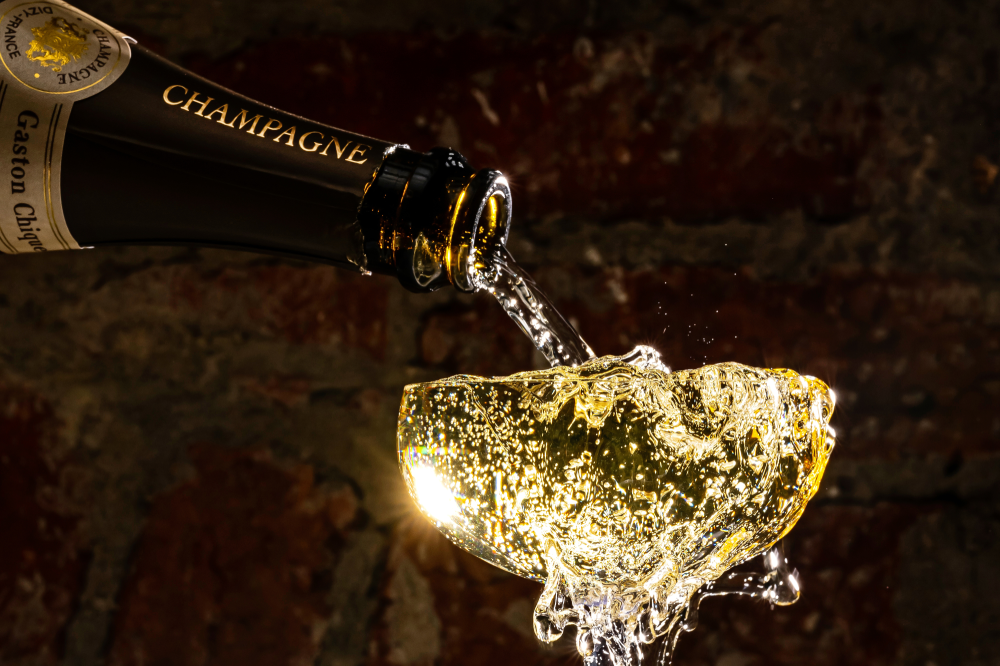Drink
 Photo by Scott Suchman.
Photo by Scott Suchman.
Sparkling Sustainability
December 1, 2022 @ 12:00pm
Last year was the biggest for bubbly ever. There were 322 million bottles of champagne sold — a 32% increase from 2020. Made in a relatively small 132 square mile region of France, the grape growers and wine producers have an outsized carbon footprint. The region has been formally addressing the issue since 2003 when it oversaw a comprehensive environmental impact review.
“They were getting a lot of flak from the rest of France and frankly, the rest of the world, about how inefficient they were as a region,” says sommelier Mika Carlin, who co-owns wine bar tasting menu restaurant Irregardless with her husband Ian Carlin; it opened mid-September in the H Street Corridor.
The Comité Champagne — the trade association representing champagne growers and houses — set a goal to collectively reduce their carbon footprint by 25% by 2025 and 75% by 2050. Easier said than done.
“It’s a matter of getting everybody on board, which is always tough when it’s a voluntary process,” Carlin notes.
There have been significant strides. As of 2019, 20% of the total vineyard surface area in Champagne is under environmental certification, the carbon footprint of each bottle of champagne decreased 20% and the use of phytosanitary products (including pesticides) and nitrogen fertilizers was halved.
On a granular level, each producer is undertaking different steps of varying intensities to become more eco-conscious, which Carlin weighs heavily when drawing up her wine list.
“We like to focus on sustainable, organic, biodynamic and natural wine producers,” she says.
These terms have varying meanings, so Carlin shares her quick definition of each: Natural means low intervention with usually no fining and filtering, and minimal or no sulfites. The word sustainable is applied to the environment and labor practices so both the land and people working it are not excessively overworked and are treated respectfully. Organic means no pesticides or herbicides are used, while biodynamic refers to producers who view their vineyards as closed ecosystems and may embrace more esoteric practices, such as planting and harvesting grapes in conjunction with the lunar cycle.
Though some larger champagne producers are experimenting with or embracing some of these earth-friendly techniques, they are not the industry norm.
“Oftentimes, that means instead we are choosing to stock bottles from growers who are on the smaller side and more forthcoming about their farming practices,” Carlin says. “They’re usually willing to go into hilariously nerdy detail about their farming practices and how they behave in the vineyard. Having that information is important for us because we tell our guests, ‘You can feel good about having this wine.’”
A few sustainably-minded sparkling standouts Carlin chose for her current wine list include Gaston Chiquet’s Blanc de Blancs d’Aÿ with pastry, brioche notes along with tones of apple and bright yellow pear; Charles Dufour’s Tchin Tchin made with pinot blanc grapes, adding a pear edge to the minerality of the wine; the bread-toned, energetic Francoise Martinot Bistrotage B.14+1; and biodynamically produced Shaman Rosé by Champagne Marguet, full of cherry and strawberry notes.
The ideal of sustainability pervades Irregardless beyond the wine list, seeping into the foundations of the restaurant’s labor practices. Staffers earn at least $16.10 an hour; they are offered health insurance with a 50-50 contribution; family meal is served every day. This is partially made possible by a 20% service charge. To subsidize base wages, 40% of the service charge goes to the house; the remaining 60%, plus any additional tips, goes into a pool divided among all non-salaried employees, including servers, food runners, bussers, bartenders, line cooks and the dishwasher.
“It’s to encourage teamwork and make sure everyone’s helping each other out,” Carlin says. “But it’s also to recognize when we get really busy and we’re making more money in the front of house, the back of house is also getting slammed. They should be adequately rewarded for their efforts.”
This compensation model requires extra effort. New hires are shown a detailed spreadsheet of how the system works (“I’m sure it scares half the people I’ve spoken to,” Carlin jokes) and every day each team member receives a printout listing total sales, service charges, additional tips and the amount in the tip pool so everyone can track the health of the business and their compensation.
“We just want to be transparent,” Carlin says. “We know service charges can be a bit of a black box and scary for people, so we want to make sure everyone knows where their money’s coming from and what’s going on.”
Both Irregardless and the winemakers they choose to serve are proof wide-reaching systemic shifts are possible. It’s not easy, requiring hard work, unwavering intentionality, maybe even some sacrifices, but the results are better for the planet and for people — effort worthy of a champagne toast. Cheers to change.
Irregardless: 502 H St. NE, DC; irregardlessdc.com // @irregardlessdc







